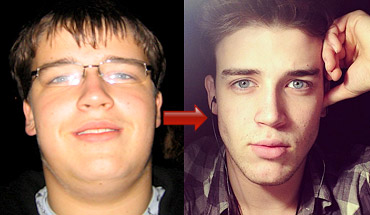high_ltn
True Pretty Boy
- Joined
- Jun 22, 2025
- Posts
- 2,422
- Reputation
- 3,963
Don't Claim To Be Subhuman Or Deformed If You Haven't Decreased Your Bodyfat Percentage!
Before I get into this I would like to thank @GhostBoySwag for help on making high quality threads, if you are a stupid low iq user and want to make good quality threads I advise that you definitely check him out!
@Glorious King Recommended that I make a thread about this
Introduction
What is bodyfat?Before I get into this I would like to thank @GhostBoySwag for help on making high quality threads, if you are a stupid low iq user and want to make good quality threads I advise that you definitely check him out!
@Glorious King Recommended that I make a thread about this
Introduction
Body fat is the volume of fat tissue in your body, measured in terms of either your total body weight (body fat percentage) or an absolute mass (in kilograms or pounds). Simply put, it’s stored energy your body retains in the form of fat cells (adipose tissue). You need some fat for survival, and the rest is redundant stored-in energy your body is able to use in the future.
Types of Body Fat
Essential Fat: Required for cell structure, hormone manufacture, physical functions, protection of organs, and temperature holding and controlling. Found in brain, bone marrow, and nerves, and cell membranes. Males require approximately 2–5%, and females approximately 10–13% because of reproductive activity.
Storage Fat: Additional strength your body reserves for future use. Stored in the skin (subcutaneous fat) and within internal organs (visceral fat). Excessiveness of this can raise health vulnerabilities.
Healthy Body Fat Percentages
Category | Men | Women |
| Essential fat | 2–5% | 10–13% |
| Athletes | 6–13% | 14–20% |
| Fitness | 14–17% | 21–24% |
| Average | 18–24% | 25–31% |
| Obese | 25%+ | 32%+ |
Why does it matter?
Too little fat in bodies -> hormonal problems, lethargy, immunological frailty.
Excess body fat -> increased risk of heart disease, diabetes, arthritis, and inflammation. The goal isn’t zero fat but a healthy balance that supports energy, hormone health, and physical function.
What effects does it have facially?
Low Body Fat (usually 6–12% for men, 15–20% for women)Facial appearance: Thinner jawline and cheekbones get more defined. Less cheek fullness -> the “baby fat” appearance goes away. Under-eye or temple hollows could show up in case of too much thinning. The face appears angular, positioned, or shaped, and is usually described as more “model-like” or athletic looking. Skin tightness improves short-term, but very low fat can make the skin look thinner or tired over time.
Examples: exercise models, athletes, actors in preparation for roles.
Moderate/Healthy Body Fat (around 13–18% men, 21–26% women)
Facial appearance: Balanced appearance -> jaw still defined but not too defined. Mild cheek fullness, achieving natural, young appearance. Eyes look in proportion, and the skin usually appears smoother and more moist. This is generally regarded as the safest and sustainable range for facial aesthetes.
Examples: average lean individuals, actors outside of extreme conditioning cycles.
Higher Body Fat (20%+ men, 28%+ women)
Facial look: Softer aspects -> cheekbones and jawline less prominent. Round fuller cheeks and occasionally a fuller or flier face. May form submental fat (below the chin), obscuring jaw line. Regularly appears more youthful because volume is maintained, but also may appear foggier or less defined. Examples: individuals with a more round or oval face shape.
So, body fat controls how much structure shows through the skin lower fat exposes bone and muscle contours, while higher fat fills and rounds out the face. The “best” level depends on what look you’re going for: aesthetic definition vs youthful softness.
How can I become a lean mean fighting machine?
Losing body fat effectively comes down to creating a sustainable calorie deficit burning more energy than you consume while keeping your muscle mass and metabolism strong. Here’s a complete guide that includes diet, exercise, and lifestyle strategies that actually work long-term.Create a calorie deficit:
Aim to eat 300–500 fewer calories per day than your body burns. This typically leads to 0.5–1 kg (1–2 lbs) of fat loss per week, which is safe and sustainable. Don’t go extreme too steep a deficit can lead to muscle loss and fatigue.
Eat a high protein diet:
Protein helps you preserve muscle, stay full longer, and boost your metabolism slightly through the thermic effect of food. Aim for 1.6–2.2 g of protein per kg of body weight daily. Good sources: chicken, fish, eggs, Greek yogurt, lean beef, and whey protein. Spread protein across meals to maintain muscle repair and appetite control.
Prioritize whole unprocessed foods:
Whole foods naturally control hunger and support fat loss because they’re nutrient-dense and harder to overeat.
Focus on:
Lean proteins (chicken, fish, eggs)
Vegetables and fruits (fiber + micronutrients)
Whole carbs (oats, rice, potatoes, quinoa)
Healthy fats (olive oil, avocado, nuts)
Avoid or limit:
Sugary drinks
Refined carbs (white bread, sweets)
Processed junk foods
Strength training (3-5x a week):
Resistance training is non-negotiable if you want to look lean rather than “skinny.”
It helps maintain or even build muscle while burning fat. Focus on compound lifts: squats, deadlifts, bench press, pull-ups, rows, and overhead presses. Train each major muscle group 2x a week for best results. Progressive overload (gradually increasing weight or reps) keeps your metabolism high.
Add cardio but don't overdo it
Cardio helps burn extra calories and improve heart health. Combine it with weights for best results.
Moderate cardio: brisk walking, cycling, or swimming (30–45 min, 3–4x per week).
HIIT (High-Intensity Interval Training): short, intense bursts for 15–20 minutes -> burns fat efficiently.
Sleep and stress control
Both sleep deprivation and chronic stress increase cortisol, which promotes fat storage (especially around the belly). Sleep 7–9 hours per night. Manage stress, Avoid excessive caffeine late in the day.
Stay Consistent and patient
Fat loss is not linear you’ll have ups and downs. Avoid crash diets; they slow metabolism and rebound quickly. Focus on long-term habits nutrition, movement, sleep, and hydration. <- Last one very important
Ideas:
Meal 1: Scrambled eggs, oats with berries
Meal 2: Chicken, rice, mixed veggies
Meal 3: Greek yogurt with almonds
Meal 4: Salmon, sweet potato, greens
Optional snacks: protein shake, apple, or cottage cheese.
Summary Table
| Calories | 300–500 kcal daily deficit |
| Protein | 1.6–2.2g/kg body weight |
| Training | 3–5x strength + optional cardio |
| Sleep | 7–9 hours |
| Lifestyle | Manage stress, stay hydrated |
Look at the difference it makes:




While most of these people wouldn't be deemed as "attractive" or "supermodels" their transformations have had had a huge impact on their facial aesthetics.
Conclusion
Conclusion
In conclusion, body fat is a natural and essential part of your body it supports hormones, protects organs, and stores energy. However, the amount you carry strongly influences not just your health, but also your facial appearance and overall physique. Lower body fat levels tend to reveal sharper features and muscle definition, while moderate levels maintain a balanced, healthy, and youthful look. Higher body fat softens the face and body contours, sometimes giving a fuller, rounder appearance.
The ideal level depends on your goals whether you prefer a lean, chiseled look or a softer, more youthful aesthetic. Losing body fat effectively means combining a sustainable calorie deficit with a high-protein diet, regular strength training, moderate cardio, and good sleep and stress management. The key is not quick fixes or starvation, but long-term consistency and balance. Ultimately, healthy fat loss isn’t just about how you look it’s about how you feel, perform, and age. A lean, nourished body supports sharper features, better energy, and greater confidence the real markers of lasting aesthetic and physical health.
I have made another thread on why it is bad to starve yourself, especially during teenage years:
https://looksmax.org/threads/teens-starving-themselves-gtfih.1625429/
Tags:
@BigBallsLarry @Orka @LTNUser
@BigBallsLarry @Orka @LTNUser
Last edited:



